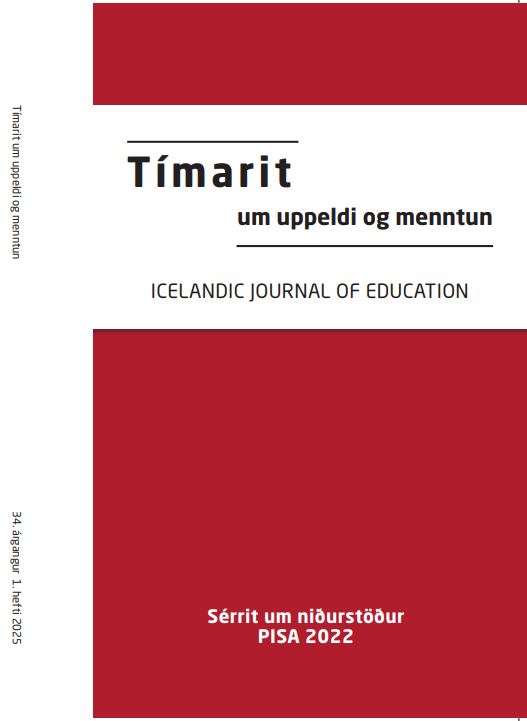Support and parent participation are important for teenagers' learning and well-being
DOI:
https://doi.org/10.24270/tuuom.2025.34.4Keywords:
parental involvement, PISA 2022, education, well-being, teenagers, compulsory schoolAbstract
The aim of this research is to shed light on parental involvement in their children’s education. On one hand, the focus is on school administrators’ assessment of parent participation in compulsory school activities (children 6–16 years old), parent initiative, and communication between parents and teachers. On the other hand, the spotlight is on 10th graders who took the PISA tests and what they say about family time at home, parental support, and interest in their studies.
Research from the OECD indicates that students who have positive family interactions are more likely to excel academically, with those in school systems emphasizing parental involvement achieving greater stability or improvement in mathematics outcomes between the PISA cycles of 2018 and 2022 (Schleicher, 2023). Despite an overall decline in parental engagement during this period, Iceland’s educational system demonstrates resilience in emphasizing equity and student well-being. Parent discussions with teenagers about future educational goals appear to be one area where Iceland excels. However, the study raises concerns about a segment of students, about one in ten, who lack consistent support or attention from family members.
In recent years, there has been a growing focus on the role of parents in supporting the educational outcomes of children and teenagers in Iceland, paralleling similar concerns worldwide (Crozier & Symeou, 2017; Jeynes, 2011). Research underscores the belief that parental involvement is essential for fostering positive educational outcomes (Sahlberg, 2015). The Icelandic National Education Policy 2030 further emphasizes the importance of collaboration between schools and families, underscoring mutual respect and trust as critical components for a positive learning environment (Mennta- og barnamálaráðuneytið, 2022).
Findings in this study align with Icelandic educational traditions, where parent discussions with teenagers often emphasize the importance of future education, fostering academic socialisation (Bæck, 2017). Resilience in well-being in education systems is one of the key metrics in the PISA study, and measures sustained support for learning, equity, and well-being despite challenges (Schleicher, 2023). Iceland stands among a selected group of 15 countries demonstrating resilience of wellbeing. A shared priority for student well-being within Icelandic education has enabled schools to maintain stability even during disruptions, such as the COVID-19 pandemic, by minimizing extended school closures and ensuring access to remote learning (Kristín Jónsdóttir, 2020). The performance gap between foreign-origin students and their native peers is a persistent concern within OECD countries, often reflecting socioeconomic disparities rather than inherent academic ability (Schleicher, 2023). However, data from Iceland indicate a narrowing gap in reading proficiency between native-born students of foreign heritage and native students. This suggests that Iceland’s focus on equity and support for diverse student backgrounds is yielding positive results (Menntamálastofnun, 2023). The unique circumstances of the COVID-19 pandemic highlighted the vulnerability of students from less advantaged backgrounds, emphasizing the need for ongoing support in Iceland’s education system (Kristín Björnsdóttir & Eiríksína Eyja Ásgrímsdóttir, 2020).
Findings in this study show that teachers in Iceland are reported to initiate most conversations with parents about student behavior or academic progress, although parents tend to be proactive in addressing behavioral concerns. Nearly 56% of Icelandic students attend schools where teachers initiate discussions on academic progress, and 27% where parents proactively discuss behavior. These patterns suggest that Icelandic parents are more likely to address personal concerns, such as behavior, but less likely to initiate discussions about academic progress than parents in other OECD countries.
The study also highlights the importance of family time, with regular family meals correlating with higher student performance across OECD nations. In Iceland, about 75% of teenagers report sharing regular meals with family members, a practice associated with an increase of 16–28 points in mathematics scores (Schleicher, 2023). Nevertheless, approximately 12% of Icelandic students rarely eat with their families, raising concerns about potential social isolation and lack of parent support.
The findings underscore the critical impact of parental engagement in various forms, from home discussions to structured school interactions. Despite a noted decline in parental involvement from 2018 to 2022, Iceland’s focus on equity and well-being has contributed to a resilient education system. Icelandic parents display notable strength in encouraging discussions about future education, a factor vital for motivating students. However, the study also highlights an under-engaged group of students who lack sufficient parent support, signaling a need for greater outreach to ensure all students receive the encouragement they need for academic success.
Downloads
Downloads
Published
Issue
Section
License
Copyright (c) 2025 Kristín Jónsdóttir

This work is licensed under a Creative Commons Attribution 4.0 International License.

This work is licensed under a Creative Commons Attribution 4.0 International License.
